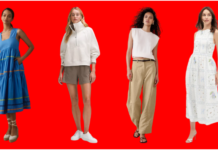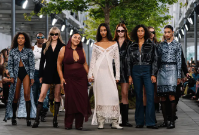Sarai Thompson has been donning the yellow, green, and black Jamaican flag ever since she was a little girl. Her parents — both Jamaican immigrants who moved to New York City before she was born — instilled in her a feeling of pride that shone through in her clothing choices.
“Fashion is a way of expressing myself, so I like to make my culture a part of that,” the now-27-year-old says. Thompson still finds herself reaching for Jamaican flag crochet tops and T-shirts, pairing them with high-waisted jeans and platform shoes.
Flag fashion is often seen as an accessory to athletic events and patriotic holidays. Think: American-flag bikinis that come out for July 4th parties or Brazilian flag T-shirts during the FIFA World Cup. “It’s easy to be lured into the false belief that flags are just innocent representations of our countries of origin or our nationality,” says Sabrina Strings, an Associate Professor of Sociology at the University of California, Irvine. But for some immigrant and BIPOC communities, wearing their flag on their sleeve — or chest, or back — can be a powerful political statement.













